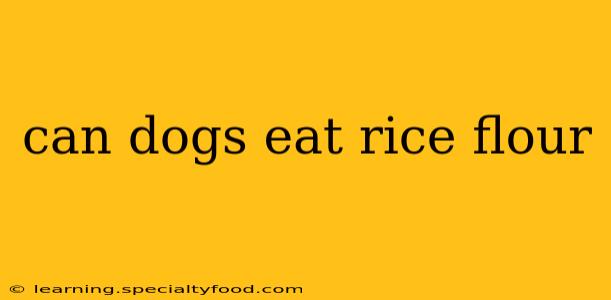Rice flour, a common ingredient in many human foods, often sparks curiosity among dog owners: is it safe for canine consumption? The short answer is: generally, yes, but with important caveats. While small amounts of plain, unseasoned rice flour are unlikely to harm a healthy dog, several factors determine its suitability for your furry friend. This guide explores the nuances of feeding rice flour to dogs, addressing common concerns and providing valuable insights.
Is Rice Flour Safe for Dogs?
Plain, unseasoned rice flour poses minimal risk to most dogs when given in moderation. It's primarily composed of carbohydrates, offering a small amount of energy. However, it lacks significant nutritional value compared to a balanced dog food. The key is moderation; large quantities can lead to digestive upset. Always introduce new foods gradually to observe any adverse reactions.
What are the Benefits of Rice Flour for Dogs?
While not a nutritional powerhouse, rice flour can serve a few limited purposes:
- Thickening Agent: In homemade dog treats or food, rice flour can act as a thickening agent, improving texture.
- Binder: It can bind ingredients together, creating a more cohesive treat or meal.
- Alternative for Sensitive Dogs: Some dogs with food allergies or sensitivities may tolerate rice flour better than other grains, but always consult your vet.
What are the Risks of Feeding Rice Flour to Dogs?
Despite its generally safe nature, several risks are associated with feeding dogs rice flour:
- Digestive Upset: Excessive intake can cause diarrhea, vomiting, or gas.
- Nutritional Imbalance: Rice flour lacks essential nutrients dogs need for optimal health. Relying on it as a primary food source is highly detrimental.
- Choking Hazard: Fine rice flour can be a choking hazard, especially for smaller breeds. Always ensure it's mixed thoroughly into other foods.
- Allergic Reactions: Although rare, some dogs may exhibit allergic reactions to rice flour.
Can Rice Flour Help with Diarrhea in Dogs?
Some dog owners use rice flour as a home remedy for diarrhea due to its binding properties. However, this is not a substitute for veterinary care. If your dog has diarrhea, consult your vet to determine the underlying cause and appropriate treatment. They can provide a proper diagnosis and recommend the best course of action.
Is Brown Rice Flour Better Than White Rice Flour for Dogs?
Brown rice flour generally retains more nutrients than white rice flour because the bran layer is still present. However, the nutritional difference is relatively small, and both should be offered sparingly.
What Kind of Rice Flour is Best for Dogs?
Opt for plain, unseasoned rice flour. Avoid varieties containing added sugars, flavors, or preservatives. Always check the ingredient list before feeding it to your dog.
How Much Rice Flour Can I Give My Dog?
There's no specific recommended daily allowance for rice flour in dogs. It should only be used as an occasional ingredient in homemade treats or as a minor component of a homemade dog food recipe, under veterinary guidance. A small amount, mixed with other healthy ingredients, is generally considered safe. Never feed large quantities.
Conclusion: Moderation is Key
Rice flour can be a safe and occasionally useful ingredient in your dog's diet, but it shouldn't be a staple. Always prioritize a balanced commercial dog food formulated to meet your dog's nutritional needs. If you're considering incorporating rice flour into your dog's diet, consult your veterinarian. They can provide personalized advice based on your dog's individual health and dietary requirements. Remember, moderation and careful observation are crucial when introducing new foods to your canine companion.
